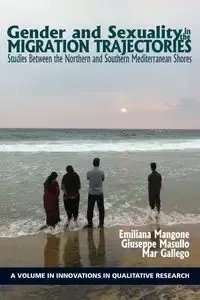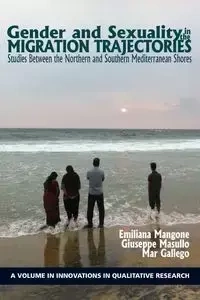Gender and Sexuality in the Migration Trajectories - Mangone Emiliana
- Studies between the Northern and Southern Mediterranean Shores
The concept of “gender” has recently become one of the symbols of what many consider “a clash of civilizations” between the West and Muslim countries. Recent events highlight how gender issues are emblematic of the basic traits of a country's culture, and thus constitute some of the elements allowing for the construction of dividing lines between cultures, arbitrarily distinguishing between the “evolved” and “backward” ones, therefore with the aim to establish demarcation lines between “Us” and the “Others”. The existential condition of migration leads to formation of multiple and diasporic identities, de-territorialized and reassembled at the individual level. In this scenario the integration of migrants is the result of a two-way process, in which rely significantly the social representations that migrants are being built on the population and of the host society (before and after the arrival) and intangible resources (cognitive and relational) experienced by migrants.
Gender studies usually employing a constructionist perspective have seldom dealt with the issue of migration by analysing the experiences of the migrants themselves. The few studies have highlighted how migrants' gender and sexuality underline the persistence of a model of domination and alteration typical of the colonial era, emphasizing the social identity allocation mechanisms used by Western societies that follow essentialist visions of migrants' ethnic and sexual identity, that is, of a social status considered as inferior and undesirable. There are several theoretical and methodological challenges calling for a perspective that takes into account the interconnection between gender, sexuality and migration. Studies on sexuality have now taken two roads, often strongly polarized and non-communicating between them: on the one hand, also because of the spread of sexually transmitted diseases, appeared a new generation of surveys on sexual behaviour of Western (and others) populations and on the changes in sexual behaviour along the main socio-economic and cultural fractures. On the other, a research trend on sexuality (New Sexuality Studies) has developed with mixed purposes, both analytical and critical-emancipatory ones. This branch, which focuses almost exclusively on the study of minority sexual subcultures, portrayed sexuality mostly through the lens of power and regarded with suspicion any attempt to develop a systematic and methodologically documented analysis of sexuality.
The book will have repercussions on the progress of knowledge from a macro dimension represented by the growth and the transformation of migration flows across the Mediterranean to Europe to meso dimension of social representations of gender and sexuality that the migrant builds himself and the population of the host society; finally, the micro dimension through the analysis of case studies. From these problems, the book aims to initiate a transdisciplinary reflection on such issues and sexuality, in part by reducing the clear vacuum in scientific research taking shape as an experimental laboratory of new research perspectives because we recognize, critically, how the methods of the social sciences do not simply reproduce the phenomena under study, but also contribute - a greater or lesser degree - to their construction. And at the same time making an issue of sex, sexuality and the multiple identifications of gender of and in migration, involving migratory experiences both on the side of leaving a country and on that of arriving to another.
EAN: 9781641131285




The concept of “gender” has recently become one of the symbols of what many consider “a clash of civilizations” between the West and Muslim countries. Recent events highlight how gender issues are emblematic of the basic traits of a country's culture, and thus constitute some of the elements allowing for the construction of dividing lines between cultures, arbitrarily distinguishing between the “evolved” and “backward” ones, therefore with the aim to establish demarcation lines between “Us” and the “Others”. The existential condition of migration leads to formation of multiple and diasporic identities, de-territorialized and reassembled at the individual level. In this scenario the integration of migrants is the result of a two-way process, in which rely significantly the social representations that migrants are being built on the population and of the host society (before and after the arrival) and intangible resources (cognitive and relational) experienced by migrants.
Gender studies usually employing a constructionist perspective have seldom dealt with the issue of migration by analysing the experiences of the migrants themselves. The few studies have highlighted how migrants' gender and sexuality underline the persistence of a model of domination and alteration typical of the colonial era, emphasizing the social identity allocation mechanisms used by Western societies that follow essentialist visions of migrants' ethnic and sexual identity, that is, of a social status considered as inferior and undesirable. There are several theoretical and methodological challenges calling for a perspective that takes into account the interconnection between gender, sexuality and migration. Studies on sexuality have now taken two roads, often strongly polarized and non-communicating between them: on the one hand, also because of the spread of sexually transmitted diseases, appeared a new generation of surveys on sexual behaviour of Western (and others) populations and on the changes in sexual behaviour along the main socio-economic and cultural fractures. On the other, a research trend on sexuality (New Sexuality Studies) has developed with mixed purposes, both analytical and critical-emancipatory ones. This branch, which focuses almost exclusively on the study of minority sexual subcultures, portrayed sexuality mostly through the lens of power and regarded with suspicion any attempt to develop a systematic and methodologically documented analysis of sexuality.
The book will have repercussions on the progress of knowledge from a macro dimension represented by the growth and the transformation of migration flows across the Mediterranean to Europe to meso dimension of social representations of gender and sexuality that the migrant builds himself and the population of the host society; finally, the micro dimension through the analysis of case studies. From these problems, the book aims to initiate a transdisciplinary reflection on such issues and sexuality, in part by reducing the clear vacuum in scientific research taking shape as an experimental laboratory of new research perspectives because we recognize, critically, how the methods of the social sciences do not simply reproduce the phenomena under study, but also contribute - a greater or lesser degree - to their construction. And at the same time making an issue of sex, sexuality and the multiple identifications of gender of and in migration, involving migratory experiences both on the side of leaving a country and on that of arriving to another.
EAN: 9781641131285

